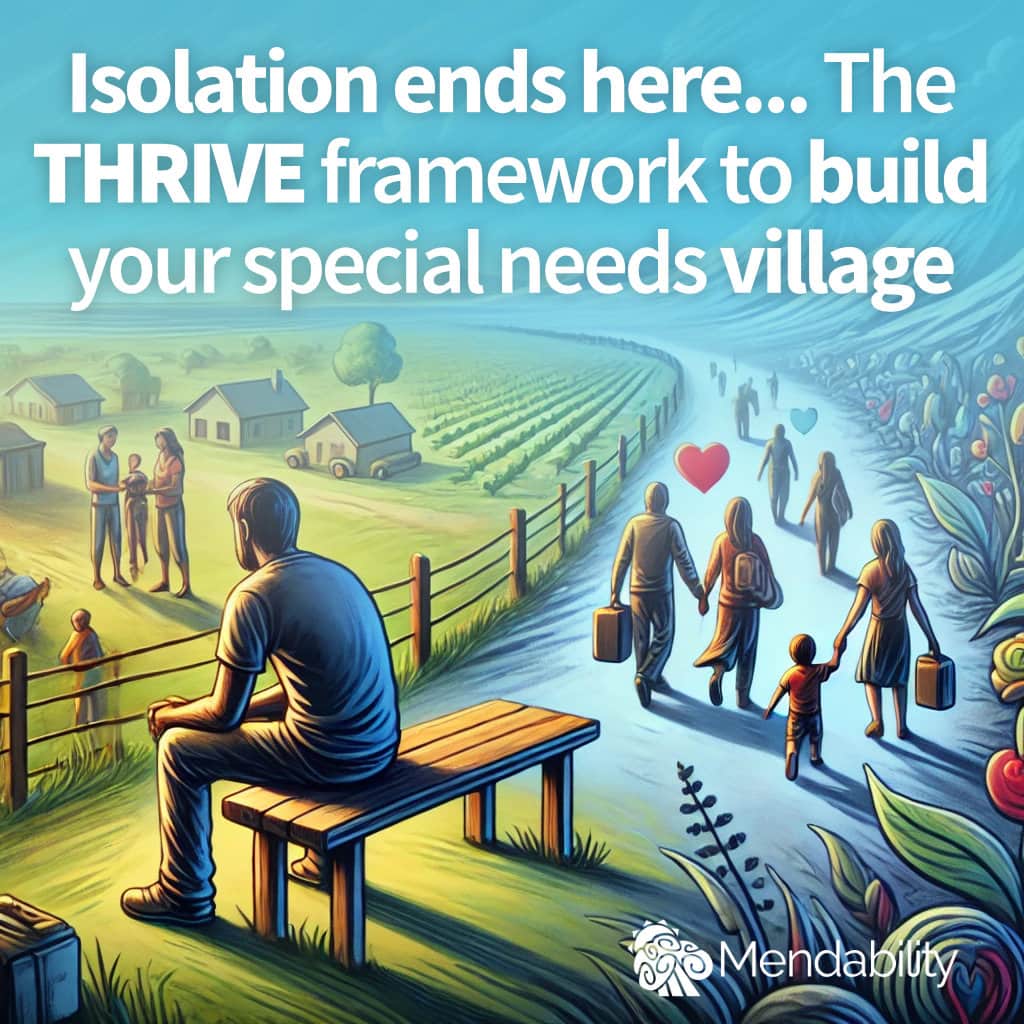Ever feel like you’re navigating the world of special needs parenting all by yourself?
You’re not alone.
Isolation is a common experience among parents of children with neurological conditions, but it doesn’t have to define your journey.
In a recent conversation with Michelle Choairy, a parent who’s walked this path, we explored practical ways to move from isolation to connection. Michelle shared her T.H.R.I.V.E. framework—a powerful tool designed to help parents build a supportive community, navigate complex systems, and celebrate the small wins that make all the difference.
YouTube Embed:
Podcast Embed:

Welcome to ‘The Happy Sensory Corner’ – the podcast where we explore the world of sensory enrichment and environmental enrichment to treat neurological conditions.
Through insightful discussions, interviews with experienced experts in a variety of fields, from nutrition to psychology, and inspiring stories of resilience, we uncover the secrets to success in raising a child with complex needs. Discover practical strategies, sensory enrichment protocols, and evidence-based practices that can transform lives one episode at a time.
Our guest, John Fela, shares his personal journey of raising a nonverbal son with autism and finding his role as a caregiving father—after years of not knowing where he fit in.
We cover:
• How dads process disability differently than moms
• What dads actually need but rarely ask for
• What saved John’s marriage… until it didn’t – and how he rebuilt again
• The emotional cost of “not being the breadwinner” in a special needs family
• The power of a single dad friendship – and why it matters more than you think
Episode Highlights
2:14 – “There’s this huge gap in the support space for dads.”
6:45 – John opens up about growing up with an emotionally absent father and how it shaped his commitment to being present
12:13 – “I had no community. I had to get community.” – John’s “Tale of Two Parking Lots” shows how connection saved him after deep isolation
19:59 – The divorce he didn’t see coming and how support networks made all the difference
32:20 – “If it’s not on the calendar, it doesn’t happen.” – How penciling in self-care and couple time helped protect his marriage
34:37 – “Moms become best friends over wine. Dads need a reason to show up.” – What it takes to build authentic dad groups
48:04 – John shares how local legend Wayne Messmer sang at his wedding and why that gesture still chokes him up
50:00 – The celebrities who quietly support the disability world—and the surprising network John is part of

Teamwork: Finding the Right Support
The saying “It takes a village” couldn’t be more true when raising a child with special needs. Yet, many parents struggle to find that village, leading to feelings of isolation and burnout. Michelle emphasized the importance of teamwork as the foundation of her T.H.R.I.V.E. framework.
You don’t have to do it alone. Building a support network starts with identifying people who truly understand your challenges. This could include other parents, specialists, or even friends who are willing to listen and offer practical help.
“You can’t do it alone—find the right people who can support you and your child.”
Research shows that parents of children with autism spectrum disorder (ASD) and other special needs often experience higher levels of stress and anxiety【source】. Having a strong support system can significantly alleviate these pressures, providing emotional and practical assistance when you need it most.
Help Systems: Navigating the Maze
If you’ve ever felt lost in the labyrinth of school districts, state programs, and insurance policies, you’re not alone. These systems can be overwhelming, especially when you’re already managing the day-to-day challenges of your child’s needs.
Michelle’s journey taught her that understanding and navigating these systems is crucial for accessing the resources your child deserves.
“Help systems are your lifeline—learn how to navigate school districts, state programs, and insurance to get the resources you need.”
Knowing where to start can make all the difference. Start by connecting with your local support organizations. These organizations offer resources and guidance to help you understand your rights and the services available to your child.
Celebrating Small Wins: Expect the Miracle
When was the last time you celebrated a small victory? For parents of children with special needs, these moments can be easy to overlook amidst the daily grind. But Michelle reminds us that these small wins are worth celebrating.
“Expect the miracle, no matter how small.”
Whether it’s finally getting out of the car without a meltdown or completing a simple task independently, these moments are significant. They’re not just milestones; they’re miracles in their own right.
Research supports this approach—celebrating small achievements can boost your child’s confidence and encourage further progress【source**】. So, take a moment to recognize and rejoice in these moments. It’s not just about the big milestones; it’s about appreciating every step forward.
Self-Care: Integration is Key
As a parent, your well-being directly impacts your child’s progress. Yet, self-care often takes a backseat to the demands of caregiving. Michelle’s T.H.R.I.V.E. framework includes self-care as a critical component—not a luxury, but a necessity.
“If you’re not well, your child won’t be either.”
Studies have shown that parents who prioritize their well-being are better equipped to support their children【source】. Even small breaks, like a walk outside or a few minutes of meditation, can recharge your batteries and make a significant difference in how you handle daily challenges.
Connection Overcomes Isolation
The journey from isolation to connection isn’t easy, but it’s possible. Michelle’s T.H.R.I.V.E. framework offers a roadmap to help you build the community you need. By focusing on teamwork, navigating help systems, celebrating small victories, and integrating self-care, you can transform your experience from one of isolation to one of connection and support.
Don’t let isolation define your story. Start building your village today.
For more insights from Michelle and other experts, tune in to our latest podcast episode.

